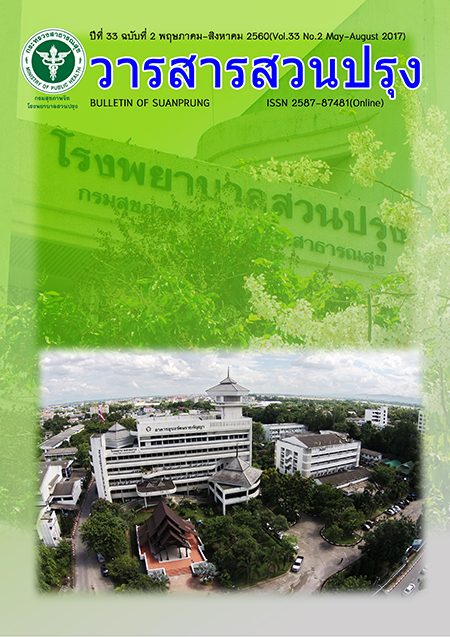Causal Relationships Among Factors Affecting New Drinkers’ Alcohol Drinking Behavior;ความสัมพันธ์เชิงสาเหตุของปัจจัยที่มีอิทธิพลต่อพฤติกรรม การดื่มเครื่องดื่มแอลกอฮอล์ของนักดื่มหน้าใหม่
Main Article Content
Abstract
Abstract
Objective: The purposes of this study were to develop and validate the causal relationships model of factors affecting new drinkers’ alcohol drinking behavior.
Materials and method: This was a quantitative research. The developed model has 3 latent variables which consisted of peer model learning, poor self-control, and alcohol drinking behavior. The participants in this study were collected by purposive sampling method, and consisted of 616 Chiang Mai students, aged between 12-18 years old, who began drinking in the last 12 months. Data were collected by general information questionnaire and peer model learning measurement which the researcher developed based on the Bandura’s theory, as well as poor self-controlling measurement which was developed by Sittipong Wattananonsakul1. Descriptive statistics were used to present the percentage of sample information and the consistency of the model was analyzed according to Structural Equation Modeling (SEM), using AMOS program.
Results: The study found that the causal relationships model of factors affecting new drinkers’ alcohol drinking behavior based on the hypothesis which the researcher presented in the conceptual framework were significantly consistent with empirical data (GFI = 0.99, AGFI = 0.97, CFI = 0.99, RMSEA = 0.30, SRMR = 0.02). The factor that directly affected new drinkers’ alcohol drinking behavior was peer model learning, while poor self-control had an indirect effect on the drinking behavior of new alcohol drinkers.
Conclusion: Peer model learning has direct effect on alcohol drinking behavior. Poor self-control has direct effect on alcohol drinking behavior and indirect effect on alcohol drinking behavior when having peer model learning as mediator.
Keywords:Poor self-control, Peer model learning, New drinkers, Alcohol drinking behavior
บทคัดย่อ
วัตถุประสงค์ เพื่อพัฒนาและตรวจสอบโมเดลความสัมพันธ์เชิงสาเหตุของปัจจัยที่มีอิทธิพลต่อพฤติกรรมการดื่มเครื่องดื่มแอลกอฮอล์ในนักดื่มหน้าใหม่
วัสดุและวิธีการ เป็นการวิจัยเชิงปริมาณ โดยโมเดลมีตัวแปรแฝง 3 ตัวแปร ประกอบด้วยการเรียนรู้ตัวแบบจากเพื่อน การควบคุมตนเองที่ไม่ดี พฤติกรรมการดื่มแอลกอฮอล์ของนักดื่มหน้าใหม่ กลุ่มตัวอย่างสุ่มแบบเฉพาะเจาะจง โดยเป็นนักเรียนที่ศึกษาในจังหวัดเชียงใหม่อายุ12 – 18 ปี ที่เริ่มดื่มเครื่องดื่มแอลกอฮอล์ครั้งแรกใน 12 เดือนที่ผ่านมา จำนวน 616 คน เครื่องมือที่ใช้ในการวิจัยประกอบด้วยแบบสอบถามข้อมูลทั่วไป แบบวัดการเรียนรู้ตัวแบบจากเพื่อน ซึ่งผู้วิจัยสร้างขึ้นตามแนวคิดของ Bandura และแบบวัดการควบคุมตนเองที่ไม่ดี ซึ่งพัฒนาโดย สิทธิพงศ์ วัฒนานนท์สกุล1โดยผู้วิจัยใช้สถิติ ค่าร้อยละ สำหรับข้อมูลทั่วไปของกลุ่มตัวอย่าง และการวิเคราะห์ความสอดคล้องของโมเดลด้วยการวิเคราะห์โมเดลสมการโครงสร้าง (Structural Equation Modeling (SEM)) โดยใช้โปรแกรม AMOS ในการวิเคราะห์ข้อมูล
ผลการศึกษา พบว่า โมเดลความสัมพันธ์เชิงสาเหตุของปัจจัยที่มีอิทธิพลต่อพฤติกรรมการดื่มเครื่องดื่มแอลกอฮอล์ในนักดื่มหน้าใหม่ตามกรอบแนวคิดทฤษฎีสอดคล้องกับข้อมูลเชิงประจักษ์ในการศึกษาครั้งนี้ (GFI = 0.99, AGFI = 0.97, CFI = 0.99, RMSEA = 0.30, SRMR = 0.02)
สรุป การเรียนรู้ตัวแบบจากเพื่อนมีอิทธิพลทางตรงกับการดื่มแอลกอฮอล์ของนักดื่มหน้าใหม่ และการควบคุมตนเองที่ไม่ดีมีอิทธิพลทางตรงกับพฤติกรรมการดื่มเครื่องดื่มแอลกอฮอล์ และมีอิทธิพลทางอ้อมโดยมีการเรียนรู้ตัวแบบจากเพื่อนเป็นตัวแปรส่งผ่าน
คำสำคัญ การควบคุมตนเอง, การเรียนรู้ตัวแบบจากเพื่อน, นักดื่มหน้าใหม่, พฤติกรรมการดื่มเครื่องดื่มแอลกอฮอล์
Article Details
บทความหลังผ่านการปรับแก้จากกองบรรณาธิการแล้ว เป็นลิขสิทธ์ของวารสารจิตเวชวิทยาสาร โรงพยาบาลสวนปรุง กรมสุขภาพจิต กระทรวงสาธารณสุข ห้ามเผยแพร่เพื่อประโยชน์ทางการค้าโดยไม่ได้รับอนุญาต แต่อนุญาตให้เผยแพร่บทความดังกล่าวเพื่อประโยชน์ทางการศึกษาแก่ประชาชนทั่วไป ทั้งนี้กองบรรณาธิการไม่จำเป็นต้องเห็นด้วยกับบทความหรือข้อคิดเห็นใดๆ ที่ปรากฏในวารสารสวนปรุง

